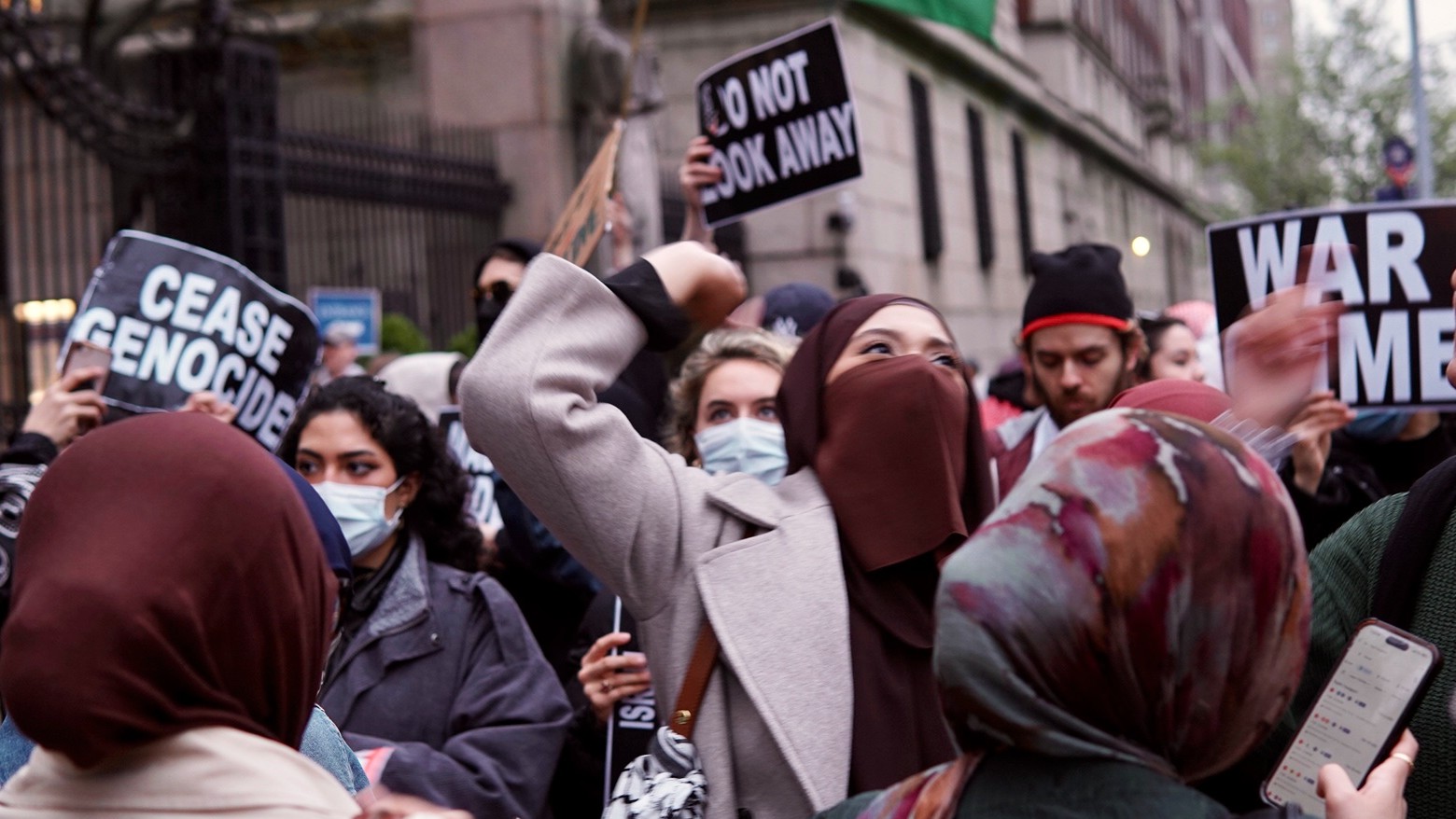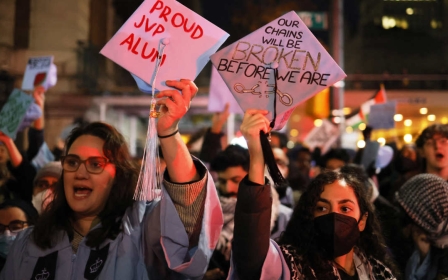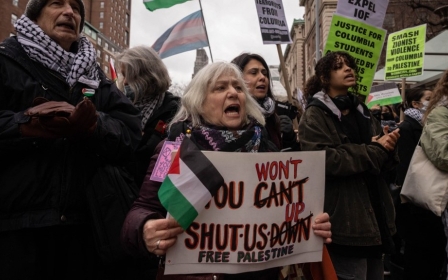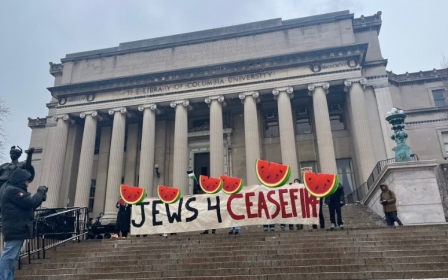Outrage at Columbia University over censure of pro-Palestine professor Mohamed Abdou
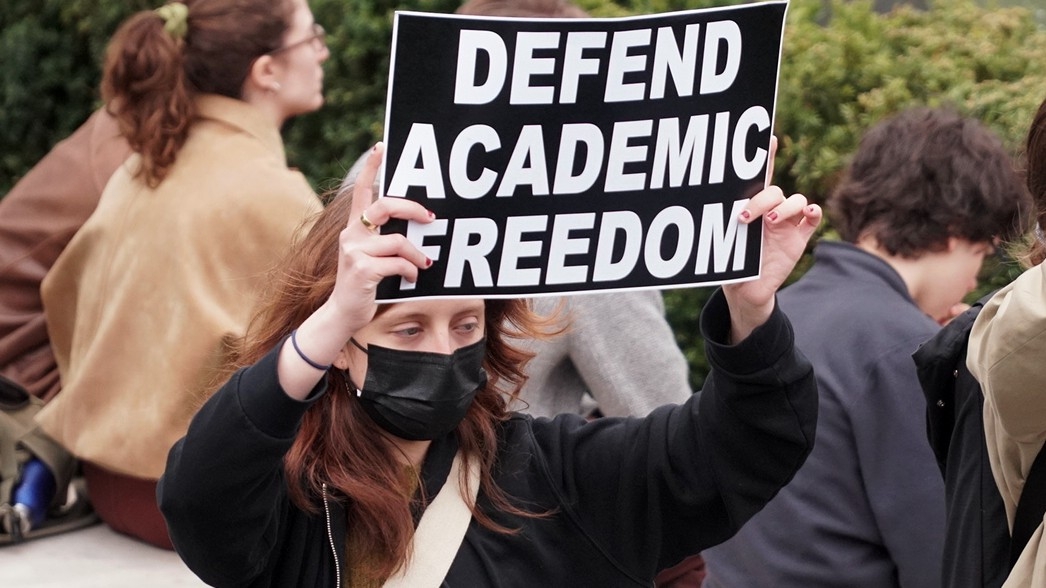
The targeting of three Columbia University academics, which led to a Muslim visiting professor's job being effectively terminated on national television earlier this week, is part of an attempt to discredit those refusing to stay quiet on Palestine, students and faculty have said.
Tensions at the New York-based Ivy league school reached a zenith this week as university administrators called in the New York Police Department (NYPD) on Thursday afternoon to tear down a student-organised "anti-war and anti-genocide" encampment on the southern lawns of the campus in Harlem just over 24 hours after it had been set up.
The arrests of more than 100 students, suspension of three others, and dismantling of the 50-plus tents by police in full riot gear took place in front of thousands of Columbia students who flooded the lawns to show solidarity with striking students.
Police were taunted by onlookers as they dragged students to busses headed for the local police station.
Outside, hundreds of other activists from the local community or other city boroughs came to signal their disgust at university president Nemat Minouche Shafik for calling on the police to arrest students peacefully protesting on campus.
Stay informed with MEE's newsletters
Sign up to get the latest alerts, insights and analysis, starting with Turkey Unpacked
"Yesterday was the most repressive response on a university campus that I've ever witnessed, Rebecca Jordan-Young, professor in the Department of Women’s, Gender and Sexuality Studies at Barnard College, at Columbia University, told Middle East Eye.
"There is so much condescension at this moment that I'm astonished, and last night, that condescension just exploded into the most dramatic display of authoritarian disrespect that I've seen on a college campus," Jordan-Young added.
Shafik's decision to call the NYPD on her students comes just a day after a Congressional hearing in which the president appeared to consent to charges of antisemitic behaviour by faculty, promising harsh penalties and consequences to those accused of the same.
Political pressure
In the close to four-hour Congressional hearing on Capitol Hill, Republican lawmakers repeatedly grilled Shafik on the university's inaction against allegations of antisemitism on campus.
One Republican lawmaker after the other focused on slogans used by pro-Palestine protesters at Columbia and specifically referenced the remarks or works of professors Joseph Massad, Katherine Franke and Mohamed Abdou when confronting Shafik.
Massad's descriptions of the events of 7 October in an op-ed he had written for Electronic Intifada were repeatedly characterised by Republican lawmakers as being celebratory in nature.
Shafik neither defended Massad nor did she clarify that these were mischaracterisations of his words. Massad has since illustrated how his words had been distorted.
Likewise, Franke's comments on former Israeli soldiers allegedly being behind the spraying of skunk water on pro-Palestinian activists in an incident on the campus in January were equally misconstrued as a call to ban all former Israeli soldiers from the campus.
Abdou was accused of having demonstrated support for the Palestinian armed group Hamas on a Facebook post on 11 October.
In response to questions on how Massad and Franke were being dealt with, Shafik said the duo were currently under investigation for making “discriminatory remarks".
But it was the way in which Shafik handled the accusations levelled at Abdou, also the author of Islam and Anarchism (Pluto Press), that brought the most consternation.
When it came to Abdou, who, unlike Massad and Franke, is not a tenured professor and is a lot more vulnerable as a member of the university faculty, Shafik's condemnation was unequivocal and damaging.
"He is grading his students’ papers and will never teach at Columbia again and that will be on his permanent record," Shafik said.
Several students, including those currently in Abdou's current class, "Decolonial Queerness and Abolition in Southwest Asia and North Africa (SWANA)" at Columbia, said they were aghast that their university president would publicly condemn the professors without embarking on a basic fact check.
In his post on Facebook on 11 October, they noted that Abdou, who joined the university in mid-2023 on a short-term contract, had written a statement in which he criticised statehood and questioned the leftist tendency to secularise the Palestinian struggle.
"As I always ask: What happens when Palestine is freed tomorrow? Will it be a one-state (a Eurocentric form of governance) as opposed to decolonial conceptualizations of governance and sovereignty from a Muslim and broadly spiritual perspective?" Abdou wrote.
"Yes, I'm with the muqawamah (the resistance) be it Hamas and Hezbollah and Islamic Jihad but up to a point - given ultimate differences over our ethical political commitments; that's the difference between a strategy and tactic too," Abdou added.
Jordan-Young, professor in the Department of Women’s, Gender and Sexuality Studies at Barnard College, said that the way Abdou was called out was not just shocking and humiliating, it was also inhumane.
"It's not fair to any scholar - to do it to someone who doesn't enjoy the security of tenure: it's inhumane," Jordan-Young said.
Nayeli, a PhD candidate at City University of New York (CUNY), currently enrolled in Abdou's class at Columbia, said that "anyone who has read professor Abdou’s statements and remarks about Hamas at any given moment in their entirety instead of just engaging with a few of his words out of context can see that he has a very nuanced, cautious, and well-informed opinion about the organisation and their actions."
"In my opinion, Zionists know this and he has never actually said anything that is worth him getting his job taken away and that’s why they are relying on such tactics to make him look bad," Nayeli, who only offered her first name, said.
Likewise, Saumya Dadoo, a doctoral student at Columbia's Department of Middle East, South Asian and African Studies, told MEE that attacks appear to be racially motivated.
"The way that Minouche Shafik singled out professors from our department and threw them under the bus to appease to politics appears racially motivated and is something that is deeply worrying to all of us committed to serious public scholarship on the lives, histories, cultures and communities of the region," Dadoo told MEE.
"In these extraordinary times, the scholarship of those from marginalised regions by those personally connected to them remains crucial and I see this as a grave mistake on Shafik’s part," the student added.
A Jewish PhD candidate currently enrolled in Abdou's class at Columbia told MEE he was outraged by the treatment meted out to Abdou.
The student, who asked to remain anonymous, told Middle East Eye that the university president firing a professor on a public platform without examining the specifics brought into question her competency as a leader.
"As scholars, all we have is our words, and if our ability to articulate complex ideas or tackle difficult subjects is taken away - we have nothing.
"Not only is he not antisemitic, he is very engaged with Jewish scholarship and is very knowledgeable about Jewish traditions. The possibility of losing his unique voice in our university is a loss for everyone," the student added.
Taking the bait
The Hamas-led attack on Israel on 7 October led to the killing of around 1,200 people, mostly Israelis, and over 200 taken back to Gaza as hostages.
Israel responded to the attack on 7 October with aerial bombardment and a ground offensive in Gaza that has killed over 34,000 Palestinians, in what human rights activists and lawyers have called a "genocide".
Columbia University has emerged as a beacon of student struggles for the rights of Palestinians and for an end to university complicity in Israel's occupation of Palestinian land.
This has also attracted scrutiny from pro-Israel supporters and the donor class.
The university, like several others, including Harvard, University of Pennsylvania, and Brown, has repeatedly faced accusations of allowing antisemitism to thrive on their campuses, culminating in hearings on Capitol Hill.
However, Palestine Legal, the organisation that protects the constitutional and civil rights of Americans who speak up for Palestinian freedom, described the hearings this week as little more than "a McCarthyist witch-hunt targeting professors and students who speak out for Palestinian rights and against genocide."
"In turn, universities are taking the bait, contributing to a wider right-wing assault on educational institutions and the teaching of everything from systemic racism to Palestine," the group said in a statement on Wednesday.
Jared Sacks, a Jewish PhD student at Columbia University who is familiar with all of the professors mentioned at the hearings on Wednesday, told MEE that administrators were using the spectre of antisemitism to silence critics of Israel. He described the professors as "caring educators, committed to addressing racism, antisemitism and Islamophobia in all its forms".
"I know they all appreciated Joseph Massad's moral clarity in differentiating between critiques of the Israeli state and a rejection against any discrimination against Jews.
"This witch-hunt against these four professors has nothing to do with actual antisemitism and is purely as punishment for their opposition to the massacring of Palestinians in Gaza," Sacks said.
Middle East Eye delivers independent and unrivalled coverage and analysis of the Middle East, North Africa and beyond. To learn more about republishing this content and the associated fees, please fill out this form. More about MEE can be found here.
![President of Columbia University Dr. Nemat (Minouche) Shafik testifies during a House Committee on Education and the Workforce hearing about antisemitism on college campuses, on Capitol Hill in Washington, DC, on April 17, 2024 Drew [ANGERER / AFP]](jpg/shafik.jpg)
